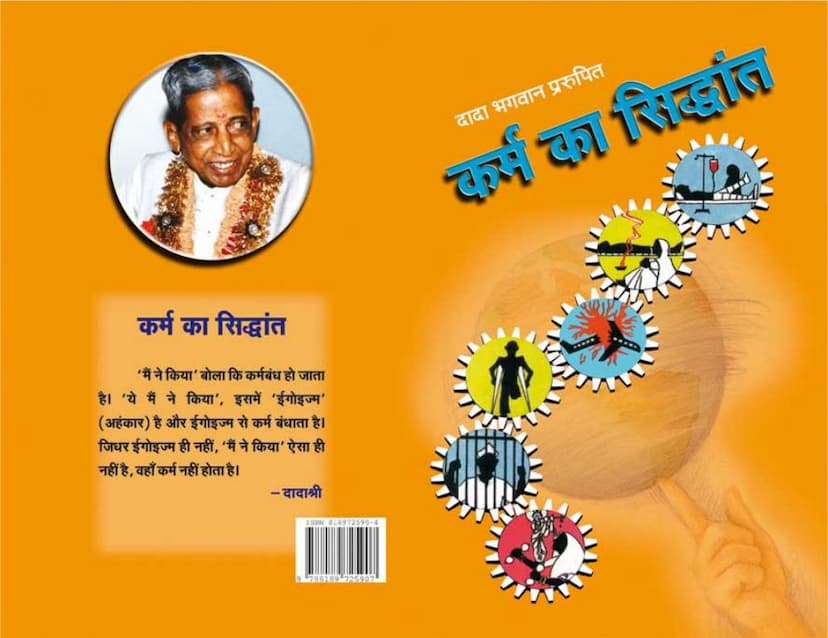Karma Ka Vigyan
Added to library: September 2, 2025

Summary
Here's a comprehensive summary of the Jain text "Karma Ka Vigyan" (The Science of Karma) by Dada Bhagwan, based on the provided pages:
Core Philosophy: The Nature of Karma and Liberation
The central message of "Karma Ka Vigyan" is a profound exploration of the Jain principle of karma, presented through the teachings of Dada Bhagwan. The fundamental idea is that karma is not an external force but a consequence of one's own actions, thoughts, and intentions, driven by egoism and the belief of being the doer ("I have done it"). Liberation (Moksha) is achieved by eradicating this egoism and realizing one's true self as the Soul (Atma).
Key Concepts and Principles:
- Egoism as the Root of Karma: The text repeatedly emphasizes that the belief "I have done it" is the primary cause of karmic bondage. This egoism, or "I-ness," creates new karma. Where egoism is absent, karma does not bind.
- The Illusion of the "Doer": Dada Bhagwan explains that the actions we perceive ourselves performing (eating, drinking, speaking, business, etc.) are not truly done by our real Self (Atma) but by the egoistic self, identified as the body, mind, or name (e.g., "Ravindra"). The Atma is a passive witness.
- Karma as a Scientific Process: Karma is presented as a scientific phenomenon, governed by cause and effect. There's no external deity or force distributing karmic consequences. The world operates on scientific, circumstantial evidence.
- Karma vs. Karmaphal (Fruit of Karma): What is commonly perceived as "karma" (actions, duties, religious practices) is actually the result or fruit of past karma (karmaphal). The true "karma" is the subtle seed planted by the belief of being the doer, fueled by ignorance.
- Charging and Discharging Karma: Karma is "charged" through egoistic actions and intentions. When the consequences of these charged karmas manifest, they are "discharged." Liberation occurs when the charging of new karma ceases, and the existing discharged karma is experienced with equanimity.
- The Role of "Akram Marg" (The Unfolding Path): Dada Bhagwan's teachings are characterized as the "Akram Marg," or the shortcut/lift path to self-realization. Unlike gradual paths, this method allows for direct knowledge of the Self and the cessation of karmic charging within a short time.
- The Nature of Suffering: Suffering arises from the egoistic identification with the body and the belief of being the doer. When suffering arises, it's often the discharge of past karma. Reacting to suffering with attachment or aversion (raag-dwesh) creates new karma.
- The Importance of "Nimit" (Instrument): All actions are ultimately carried out by various forces and circumstances ("Nimit"). Even when we appear to be acting, we are merely instruments. Recognizing this diminishes egoism.
- Subtle vs. Gross Karma: Gross karma is visible to others and its results are experienced in this life. Subtle karma, arising from internal states of attachment and aversion, manifests in future lives.
- The Cause of Differences: The variations in people's lives (wealth, poverty, ability) are due to past karma and not due to any fault of the current self.
- The Nature of Desire and Fulfillment: Desires are a product of past karma. While some desires are fulfilled, new desires arise. True contentment comes from realizing the Self, not from fulfilling worldly desires.
- The "Electric Body" (Subtle Body): The text touches upon the concept of a subtle, electrical body that accompanies the soul, facilitating biological processes and carrying karmic impressions. This subtle body is not the mind, intellect, or ego (antahkaran), which are internal faculties.
- Purity of the Soul: The Soul (Atma) is inherently pure and unchanging. It is the egoistic self that gets entangled with karmas and experiences suffering.
- The Role of "Gyan" (Knowledge): Receiving "Gyan" from a Gnani Purush (Enlightened Being) is crucial. This knowledge fractures ignorance, reveals the true Self, and stops the charging of new karma, thus paving the path to liberation.
- The Distinction Between "Niyat" (Destiny) and "Purusharth" (Effort): While destiny (Prarabdha) plays a role, true "Purusharth" lies in the inner intention and the choice to not identify with the ego. The interaction between destiny and effort is explained through scientific circumstantial evidence.
- The Nature of Donation (Daan): The purity of intention behind a donation is more important than the act itself. Secret donations with pure intent yield greater results than public donations with egoistic motives.
- The Essence of Life's Events: Everything that happens, whether pleasant or unpleasant, is a result of past karma and is essentially a discharge. The key is to remain a detached observer and not create new karma through reactions.
Dada Bhagwan's Unique Contribution:
The book highlights Dada Bhagwan's unique approach to spiritual realization:
- The "Akram Marg": He provided a direct path to self-knowledge, enabling individuals to realize their true Self in a matter of hours.
- Self-Realization: His teachings focused on identifying the true Self, distinct from the body, mind, and ego.
- Practical Science: The principles of karma are presented as a practical science that can be understood and applied to resolve life's problems.
The Publisher and Editor:
The book is published by the Dada Bhagwan Foundation. The editor, Dr. Niruben Amin, is presented as someone who received self-knowledge from Dada Bhagwan and continues to disseminate his teachings.
Overall Message:
"Karma Ka Vigyan" offers a revolutionary perspective on karma, shifting the focus from external retribution to internal causation. By understanding the scientific principles of karma and eradicating egoism through self-knowledge, individuals can break free from the cycle of birth and death and attain liberation. The emphasis is on living as a detached observer, free from the illusion of being the doer, thereby ceasing the creation of new karma and experiencing the bliss of the true Self.